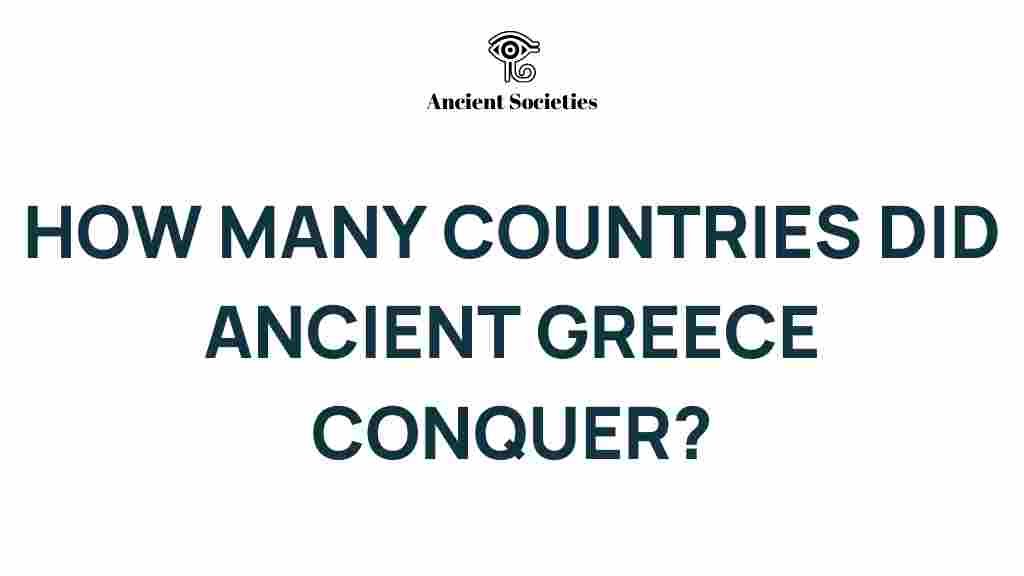Ancient Greece: The Conquest and Influence on Nations
Ancient Greece is often regarded as a cornerstone of Western civilization, with its remarkable contributions to various fields such as philosophy, mathematics, art, and politics. However, one of the most significant aspects of Ancient Greece is its extensive reach and influence across multiple nations. From the conquests of Alexander the Great to the cultural diffusion that occurred through trade and colonization, the legacy of Ancient Greece is profound. In this article, we will explore how many nations fell under the shadow of Ancient Greece, examining its empires, warfare, and enduring cultural influence.
The Historical Context of Ancient Greece
To understand the reach of Ancient Greece, it is essential to look at its historical context. Ancient Greece was not a single nation but a collection of city-states (poleis), each with its own government and culture. Major city-states included Athens, Sparta, Corinth, and Thebes. These city-states often competed and sometimes cooperated, leading to a complex tapestry of alliances and rivalries.
The period known as the Classical Age, around the 5th to 4th centuries BCE, marked the height of Greek power and cultural achievement. This was also the time when Greece began to expand its influence beyond its borders.
Key Empires and Conquests
The reach of Ancient Greece can be largely attributed to two significant empires: the Athenian Empire and the Macedonian Empire. Each played a crucial role in spreading Greek culture, language, and political ideas across vast territories.
- Athenian Empire: After the Persian Wars, Athens emerged as a dominant naval power and established the Delian League, a coalition of city-states that aimed to defend against Persian aggression. Through its leadership, Athens exerted considerable influence over its allies and expanded its cultural and political dominance.
- Macedonian Empire: Alexander the Great, a student of Aristotle, launched an unprecedented campaign that extended Greek influence to the far reaches of Asia and Egypt. His conquests from 334 to 323 BCE established one of the largest empires in history, reaching as far as India.
The Cultural Influence of Ancient Greece
The cultural influence of Ancient Greece is perhaps its most enduring legacy. Greek language, philosophy, art, and political ideas have left an indelible mark on many nations. Some of the key areas of influence include:
- Philosophy: Greek philosophers such as Socrates, Plato, and Aristotle laid the groundwork for Western philosophy. Their ideas about ethics, politics, and metaphysics continue to shape modern thought.
- Art and Architecture: The architectural styles of Ancient Greece, characterized by columns and symmetry, have influenced buildings across the globe. The Parthenon remains a symbol of this architectural prowess.
- Political Systems: The concept of democracy, particularly as practiced in Athens, has inspired countless political systems worldwide, promoting the idea of citizen participation in governance.
Warfare and the Expansion of Influence
The military prowess of Ancient Greece facilitated its expansion. The Greeks developed advanced tactics and formations, most notably the phalanx, which allowed for effective warfare against larger armies. Key battles such as:
- Battle of Marathon (490 BCE): A pivotal confrontation during the Persian Wars where the outnumbered Athenians defeated the Persians.
- Battle of Salamis (480 BCE): A naval battle that showcased the superiority of the Athenian fleet against the Persian navy.
- Conquests of Alexander the Great: His campaigns against the Persian Empire and beyond established Greek cities and culture as far east as India.
Nations That Fell Under Greek Influence
As Ancient Greece expanded its reach, several nations and regions fell under its shadow, either through military conquest, colonization, or cultural diffusion:
- Asia Minor (modern-day Turkey): Several Greek city-states were established along the coast, and the region became a melting pot of Greek and local cultures.
- Egypt: After Alexander’s conquest, Alexandria became a major center of learning and culture, blending Greek and Egyptian traditions.
- Persia: The defeat of the Persian Empire by Alexander led to the spread of Greek culture across the former Persian territories.
- Regions of the Levant: Areas such as modern-day Lebanon, Syria, and Israel experienced significant Hellenistic influence post-Alexander.
- Parts of Central Asia and India: The Greco-Bactrian Kingdom and the Indo-Greek Kingdom facilitated cultural exchange between Greek and Indian civilizations.
The Legacy of Ancient Greece
The impact of Ancient Greece on subsequent civilizations is immeasurable. Its legacy can be seen in various aspects of modern society, including:
- Language: Many English words and scientific terms are derived from Greek, reflecting its linguistic influence.
- Art and Literature: The themes and techniques of Greek tragedies and epics continue to inspire artists and writers today.
- Scientific Thought: Greek contributions to mathematics, astronomy, and medicine laid the framework for future discoveries.
Challenges in Understanding Ancient Greek Influence
While the reach of Ancient Greece is vast, understanding it fully poses certain challenges:
- Fragmentary Historical Records: Much of what we know comes from later historians, which can lead to biases and gaps in the historical narrative.
- Variability of Influence: The extent and nature of Greek influence varied widely between regions, making it difficult to generalize about its impact.
- Modern Interpretations: Contemporary perspectives can sometimes overshadow the original context of Greek contributions.
Conclusion: The Enduring Shadow of Ancient Greece
In summary, Ancient Greece’s reach extended far beyond its geographical boundaries, influencing numerous nations through conquest, cultural exchange, and the dissemination of ideas. The legacies of its empires, the richness of its culture, and the innovations in warfare have all contributed to shaping the modern world. As we continue to explore our history, the lessons and influences of Ancient Greece remain a vital part of our understanding.
For further reading on the cultural impacts of Ancient Greece, you may visit this interesting article. Additionally, to explore more about the history of empires, check out this resource.
This article is in the category Empires and created by AncientSocieties Team
